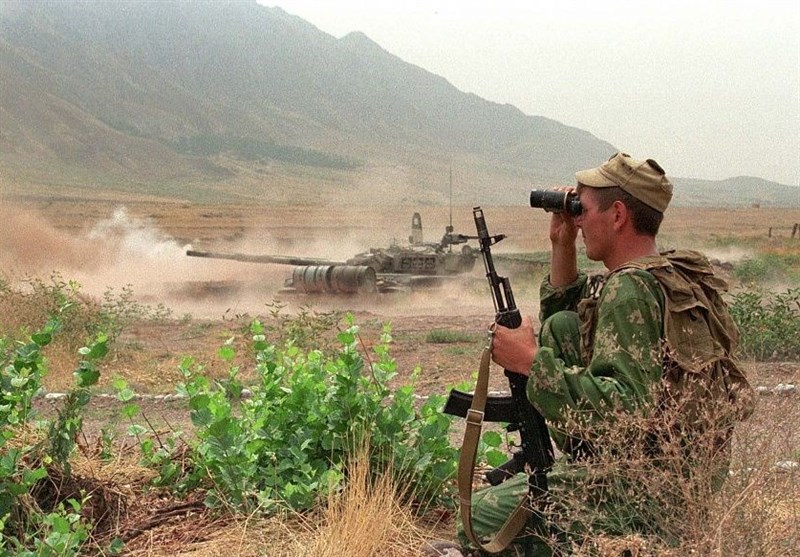Shoayb Bahman told the Strategic Council on Foreign Relations that Russia, Tajikistan and Uzbekistan held a joint wargame near the border with Afghanistan in reaction to the threats of the Taliban, adding that “Russia, during the past years, has played a very effective and direct role in safeguarding the borders of Tajikistan.”
He added that Russian forces are present in most border areas of Tajikistan with other countries especially in Badakhshan region which has been separated between Afghanistan and Tajikistan, saying it is important for Russia to be able to strengthen is defense fortifications in that area.
Security status of Tajikistan
He said the government of Tajikistan does not have the capability to fight the infiltration of radical and terrorist groups alone and has sought Russia’s help.
“Additionally, the security situation in Tajikistan has faced challenges. This country has passed a civil war in the 1990s after the collapse of the former Soviet Union and during the past years, there has been differences and internal tensions in that country.
This university professor said despite the success of Imamali Rahman the President of Tajikistan to pacify the situation in a great extent in that country, there are many oppositions to his government mainly from Islamist currents. In fact the Islamic Movement Party which is considered a moderate Islamic movement is the main opposition of the government. In addition, some radical currents have been created during the past years and have underground activities.
“The prohibition of the activities of the Islamic Party in recent years has caused many youths in Tajikistan to incline towards more radical groups as we witnessed the presence of some Tajiki nationals in Syria and Iraq to join radical groups such as Daesh. Therefore, even though we do not see an objective manifestation in Tajikistan, social dissatisfaction is high and on the rise in Tajikistan.”
Bahman emphasized that “there is concern about empowerment of a radical force or another Daesh in Afghanistan and or any foreign instigation or movement would result in the recruitment of Tajik nationals and create serious challenges. In addition, developments in Afghanistan especially during the past three months have resulted in the empowerment of the Taliban and their control over a greater number of Afghan provinces. Now all Central Asian states especially Tajikistan and Uzbekistan have concerns about this.”
The possibility of spread of security challenges from Afghanistan to Central Asia
This expert of international issues said any instability and insecurity in Afghanistan can easily spread to Central Asia states and could create numerous security challenges for them. The main goal behind the wargame among forces from Russia, Uzbekistan and Tajikistan is to strengthen their defense capabilities and demonstrate foreigners that they are prepared to combat crises.
He said Russia’s approach concerning the US withdrawal from Afghanistan and creating trouble in that country was effective in holding this wargame, adding that “Russians imagine that developments in Afghanistan and the US withdrawal from this country in this period includes a more extensive and bigger design and the goal is to spread turbulence and chaos from Afghanistan to other Central Asian countries in the case of which the national security of Russia will be seriously endangered.”
Bahman said we have always been witness to the link between radical groups and their counterparts in Afghanistan, adding that in recent decades, this communication has expanded and in many cases, Central Asian countries acted as the strategic follower of these radical groups in Afghanistan and Afghanistan turned into a safe haven for them. The news we hear today about the presence and activities of such groups in Afghanistan are real and should not be considered fake.
This expert of Eurasia affairs said that the creation of fabricated insecurity in Afghanistan and in the next stage its spread to Central Asia states would have several benefits for the United States and can be considered as a step to control Iran, Russia and China.
“The existence of insecurity and instability in this region would be very profitable for the United States.”
Developments of Afghanistan and conditions of Central Asia; an opportunity for a common role for Russia and China
Referring to some analyzed concerning the efforts by Russia and China to exploit the status quo to increase their influence in Central Asia, he said given the plan the US has devised for the region, if conditions are appropriate for Moscow and Beijing to reach the conclusion that these developments are a US plan, they will definitely get united and would use specially the capacity of the Shanghai Cooperation Organization to confront it.
Asked about the grounds for cooperation and competition between China and Russia in Central Asia, he said in recent years what has been transpiring in this region has resulted in cooperation between these two powers other than rivalry. Of course, recently the Chinese were successful in expanding their economic influence in this region as commercial transactions of China and Central Asian states exceeded those of Russia and in fact, the Chinese have replaced Russians in the area of trade in Central Asia. However, in security areas, the Russians still have an upper hand.
Bahman in the meantime emphasized that rivalry between Russia and China in Central Asia would not end in hostility but these two countries have been able to manage this rivalry through various mechanisms.
“Russian and China under the present conditions and especially against the US can be allies more than being rivals and would definitely act united against the US plans to create chaos and turbulence.”
He concluded that cooperation between Russia and China is an opportunity for deepening cooperation with Iran especially in security fields.










0 Comments